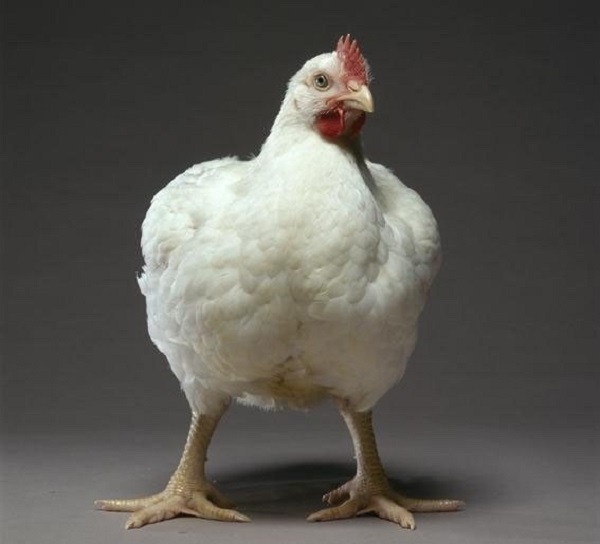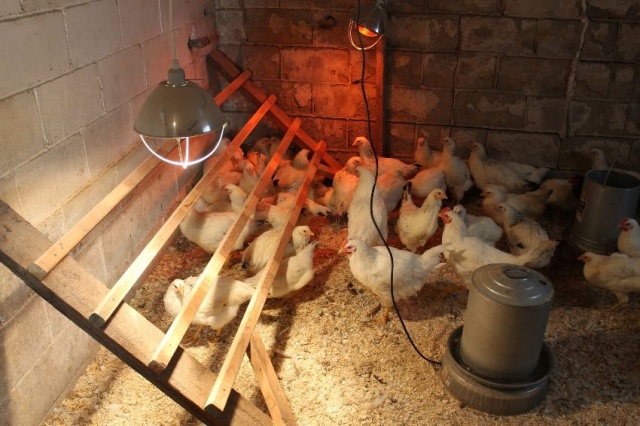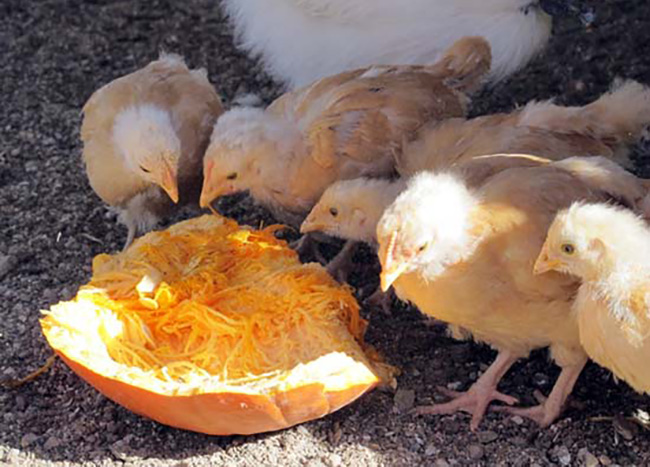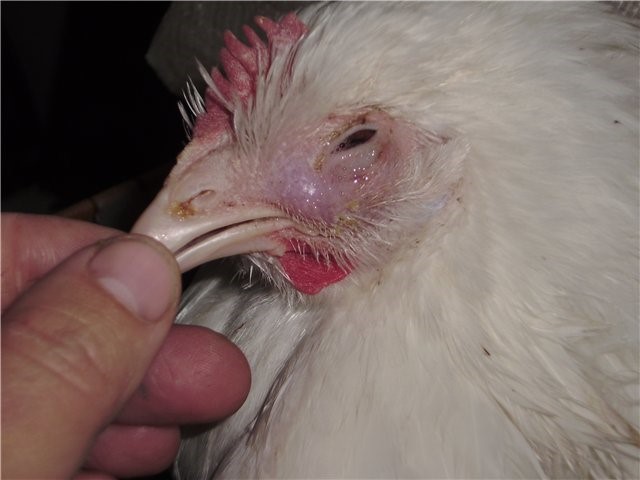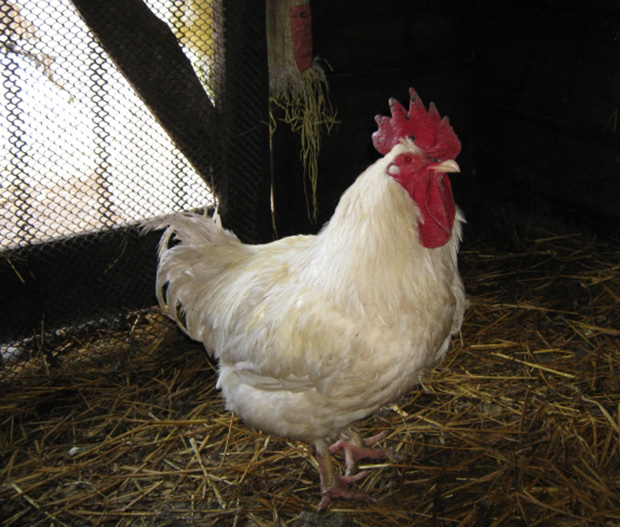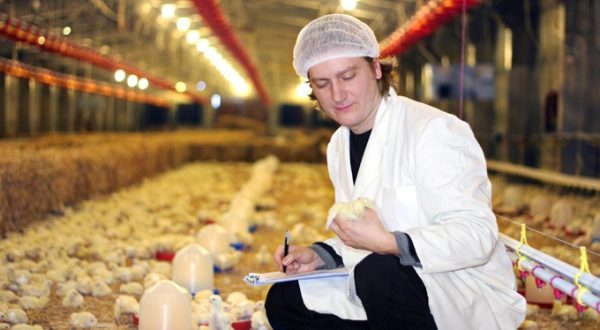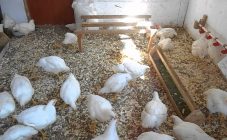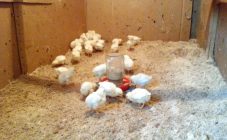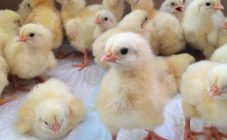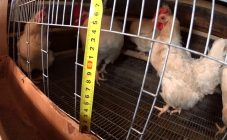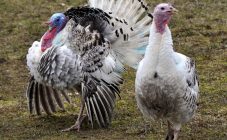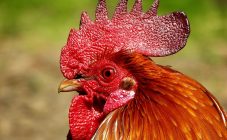Content:
Very often now you can hear the word "broilers". Broiler chickens are a type of chickens that grow to a mass of 2-3 kilograms within 7-8 weeks.
Broiler is a hybrid obtained by crossing two other chicken breeds.
Broiler chickens often get sick at a young age. To avoid early diseases, it is necessary to properly care for the birds, carry out prevention, recognize the first symptoms of diseases and begin treatment in a timely manner. Every farmer wants his birds to be healthy. When broilers wheeze, the question is how to treat them.
Broiler care rules at home
There are two methods for growing broilers at home: cage and floor.
In cage breeding of chickens, so-called "batteries" of cages are used. These are several sectors of cells located in two or three tiers.
The outdoor method of raising chickens involves breeding in a chicken coop or shed. The conditions of detention with this method are close to natural.
For any kind of breeding, birds need competent care. The complex of care measures includes high-quality food, cleanliness of the room, maintaining a comfortable temperature and humidity, round-the-clock lighting.
The temperature at which birds are kept depends on their age. Chicks that are less than a week old need warmth the most. The temperature for them is maintained in the range from 32 to 35 degrees. From the second week, the temperature can be gradually reduced to 30 degrees. Chicks at the age of 15-20 days already feel comfortable at 28-26 degrees. From the third week, the temperature can be lowered to 20 degrees.
Industrial or household heaters, infrared lamps are used to heat the room.
It is important to keep humidity at 60-70%. Chicks need fresh air, you need to organize ventilation and the flow of clean air.
Chicks need 24/7 lighting during their first week. Starting from the second week, daylight hours can be gradually shortened to 14-16 hours.
Broiler feeding should be high in vitamins and proteins. At home, dry grain mixtures are used as feed. Egg powder, mineral dressings and vitamin complexes are added to them for the purpose of enrichment. Usually a dry mixture is mixed with a liquid base, such a mass is called a mash.
In the first days of development, the chick needs high-quality food rich in carbohydrates and proteins. A mixture of barley, wheat, corn flour is steamed in water. For the first 5-7 days, young broilers need plenty of fluids. Water is disinfected with potassium permanganate, for disinfection and disinfection.
Greens, grated carrots and cottage cheese are added to the diet of weekly chickens. For the prevention of diseases, vitamins C and E are added to the water. The water enriched with vitamins has antioxidant properties and protects the cells of the body from damage.
In the second week, the body of a growing broiler gets stronger, so you can gradually add pumpkin, boiled potatoes, black bread to the daily diet.
You can diversify the mash of three-week-old chicken with protein-fortified dairy products. Other animal products are also added: liver, bone meal, fish. The mash can be steamed not in water, but cooked in meat or fish broth. Products must be of high quality and fresh.
Monthly animals are considered adults. Almost any food can be added to their diet, because chickens are not whimsical in their diet. You can use legumes (peas, beans), oats, soy as a dry basis for the mash. The liquid base can be sunflower meal or fish oil. Beets, cabbage, salad are added from vegetables. Sometimes a finely chopped boiled egg is added to food. The source of calcium is eggshells, chalk, or special calcium supplements.
If the chickens do not have time to eat everything, the portions are reduced. If, on the contrary, the feed is eaten quickly, the dose is increased.
To reduce the risk of illness in young chickens, drinkers and feeders are regularly cleaned and washed.
Cold symptoms in broilers
The common cold is not a deadly disease, but its complications are dangerous for young chickens. For laying hens, a cold is dangerous due to the cessation of egg production. Broilers that are seriously ill may even start to die.
In a single case of the disease in the hen house, there is a risk that the rest of the broilers will become infected. In order to avoid the spread of the common cold to all livestock, the disease must be detected and prevented in a timely manner.
The first symptoms that indicate a cold in chickens are:
- Sneezing;
- Cough;
- Noisy breathing;
- Whistling;
- Wheezing;
- Bubbling;
- Loss of appetite;
- Parted beak;
- Discharge of mucus from the nose (runny nose);
- Eyes are watery.
Colds can be triggered by drafts, low air temperatures, poor nutrition, vitamin and mineral deficiencies. After detecting symptoms in poultry houses, the question arises: how to treat the throat when broilers wheeze, bubble and cough.
Treating colds in chickens and broilers
Often breeders wonder what to do if chickens wheeze and cough, how to treat them? When chickens and broilers sneeze, immediate treatment should be taken.
A sick broiler is first removed from the rest of the birds to prevent infection of the entire livestock. The room into which the sick person is transplanted must be dry, clean and, most importantly, warm.
The air temperature is maintained above +20 degrees. If sneezing is just beginning to appear, it is recommended to powder the bird's nose with streptocide powder. The powder prevents the infection from penetrating further into the bronchi.
Broilers wheeze and sneeze how to treat first? Treatment begins with disinfection of the room where the sick broiler is kept. Turpentine mixed with bleach, lugol or iodine triethylene glycol is used as disinfection. Disinfection is carried out at least once a day.
An effective folk method of treatment with a decoction of nettle, infusion of raspberry leaves, currants, linden. Placing an aroma lamp with eucalyptus and sage essential oils will speed up the healing process. Of course, it is better not to engage in treatment with folk methods, but immediately contact a veterinarian.
Veterinarians recommend using antibiotics to get rid of colds. If the disease is severe, the chicken continues to open its beak when it breathes and wheezes, then one should resort to the use of drugs: enroflon, tetracycline, erythromycin, metronidazole. Usually the course of antibiotic treatment does not exceed 7 days. If necessary, you can continue treatment with drugs, but only after a three-day break. Medicines are dissolved in water for convenient use. The birds are sung with medicine through a drinker, pipette or syringe without a needle.
To restore immunity, chickens are given a complex of vitamins and minerals.
Prevention of colds in chickens and broilers
It is much easier to prevent a disease than to cure it. For this, it is necessary to regularly carry out preventive measures.
It is also necessary to disinfect the room in which the animals are kept: cleaning, cleaning and washing.
Proper and balanced nutrition ensures disease resistance. The feed enriched with vitamins and minerals will strengthen the immune system of broilers. Birds need vitamins A, B, C, D and E. Essential minerals: calcium, magnesium.
Watch the birds daily: when the first signs of illness are found in one of the individuals, it is immediately isolated. At the onset of the disease, wheezing is heard in chickens, which is accompanied by coughing and sneezing. The bird begins to choke, a whistle may appear on inhalation or exhalation, and in the throat it begins to gurgle and gurgle.
Answers to common questions
Wheezing and coughing are not always signs of a cold. It is not uncommon for a bird to choke on grain during a meal. What to do when the bird chokes? If something gets stuck in her throat, she begins to stretch her neck strongly to make it easier to breathe. If the bird chokes and cannot get rid of the stuck food on its own, you need to help it. After the cause is eliminated, the bird is given Nystatin to prevent inflammation.
Why can a bird lose its voice? The disappearance of the voice is a sign that the animal has a clogged goiter. What if the broiler has no voice? Check the beak and throat for foreign objects that make breathing difficult.
You may notice that some hens are yawning. What to do if a chicken yawns frequently? Yawning and stretching of the head indicate an inflammatory process in the goiter. What should be done if inflammation begins? They begin treatment with special chicken anti-inflammatory drugs and bronchodilators, which can be purchased at the veterinary store. An effective anti-inflammatory agent is enroflon. In case of complications, treatment is continued with antibiotics. The strong antibiotic Baytril destroys the site of inflammation.
What should be done if the chicken hiccups? Hiccuping indicates a disease - pasteurellosis. Thilan is a highly effective treatment. Tilane is dissolved in water. The solution is sung by chickens.
A closed beak suggests that it hurts the bird to open it. And, most likely, inflammatory processes have already begun. If treatment is not started in time, birds can infect each other and begin to gradually die.
With proper care for six months, you can grow a large broiler, with a lot of high-quality and tasty meat. In principle, broilers are not whimsical about keeping conditions. Good hygiene, food variety, disease prevention and seasonal vaccinations are key to success. In some cases, if a bird is sick, it is easier to slaughter it for meat than to waste time and energy on treatment.
